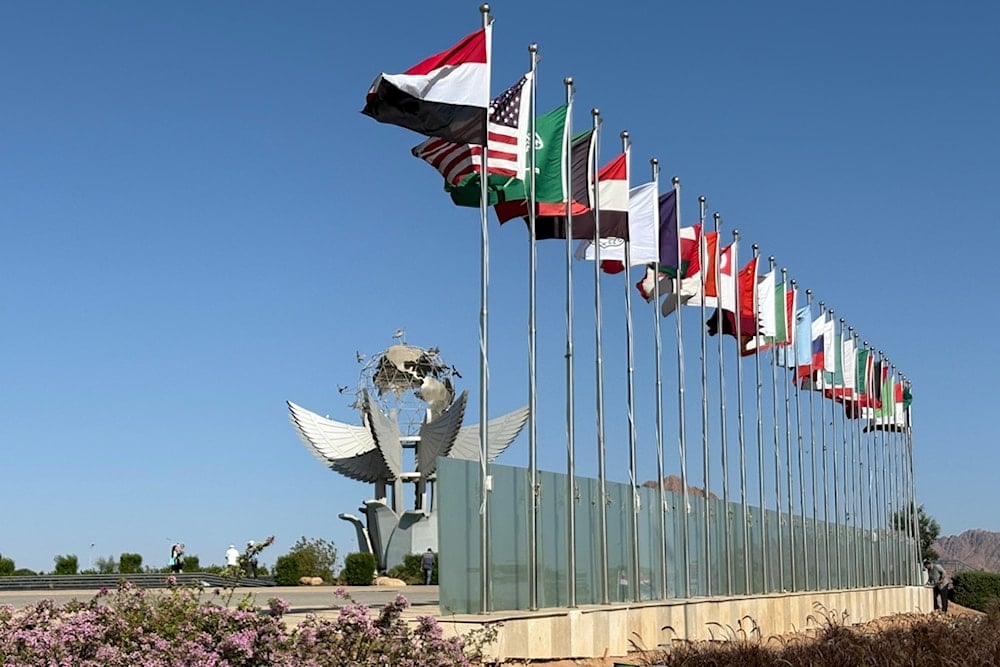Trump, el-Sisi to co-chair Gaza peace summit in Sharm el-Sheikh
The Sharm el-Sheikh summit, co-chaired by Trump and el-Sisi, seeks to consolidate the Gaza ceasefire and outline a path toward a Palestinian state.
-

Flags of participating countries at a summit hosted by the Egyptian government to celebrate the signing of the Gaza ceasefire deal, fly at the Red Sea city of Sharm el-Sheikh, Egypt, Sunday, October 12, 2025. (AP Photo)
US President Donald Trump and Egyptian President Abdel Fattah el-Sisi will jointly preside over a high-level summit on Monday in Egypt's Red Sea resort city of Sharm el-Sheikh, where world leaders will gather in an effort to chart a path toward peace in Gaza and broader regional stability.
According to a statement from el-Sisi's office, the conference will bring together "leaders from more than 20 countries" and aims "to end the war in the Gaza Strip, enhance efforts to achieve peace and stability in the Middle East, and usher in a new era of regional security and stability."
Ceasefire stalemate
The summit follows the implementation of the first phase of a fragile ceasefire in Gaza, brokered jointly by the United States, Egypt, and Qatar. That initial phase includes a temporary halt in fighting, partial Israeli troop withdrawals, and a captive-detainee exchange. The plan is part of a broader three-stage roadmap that envisions sustained calm, the entry of humanitarian aid, and the eventual reconstruction of the war-torn enclave.
However, the most contentious issues, disarmament and governance, remain unresolved. Hamas has rejected any plan requiring it to surrender its weapons, insisting that disarmament would only occur under a comprehensive political settlement guaranteeing Palestinian sovereignty. Israeli officials, meanwhile, have maintained that a permanent truce is impossible unless Hamas is fully demilitarized.
Absent voices
UN Secretary-General Antonio Guterres confirmed his attendance at the summit, along with British Prime Minister Keir Starmer, Italian Prime Minister Giorgia Meloni, Spanish Prime Minister Pedro Sanchez, and French President Emmanuel Macron. Turkish President Recep Tayyip Erdogan will also participate, while European Council President Antonio Costa is set to represent the European Union.
"The plan offers a real chance to build a just and sustainable peace, and the EU is fully committed to supporting these efforts and contributing to its implementation," a spokesperson for the European Council told AFP.
Jordan's King Abdullah II is also expected to attend, but uncertainty looms over whether Israeli Prime Minister Benjamin Netanyahu will join, as his office has yet to issue a confirmation.
Meanwhile, Hamas has ruled out direct participation. In an interview with AFP, Hossam Badran, a senior member of the group's political bureau, said the organization "will not be involved," explaining that Hamas "acted principally through... Qatari and Egyptian mediators" during earlier negotiations.
Washington’s Vision
Diplomatic sources told the Financial Times earlier this month that the United States is using the ceasefire framework to lay the groundwork for a future Palestinian state, part of a long-term plan to move from temporary truce to political resolution. The broader US proposal reportedly outlines a phased process: consolidation of the ceasefire, reconstruction under international supervision, and the eventual formation of a unified Palestinian governing body that could lead to statehood.
This approach has stirred quiet tensions with Israeli Prime Minister Benjamin Netanyahu, whose coalition remains staunchly opposed to any framework implying Palestinian sovereignty. Analysts note that Trump's push for political normalization in the region, particularly his efforts to secure a breakthrough between "Israel" and Saudi Arabia, may be driving this diplomatic urgency. Riyadh has repeatedly signaled that any normalization deal would require credible progress toward a "two-state solution", placing additional pressure on Washington to deliver movement on the Palestinian issue.

 4 Min Read
4 Min Read









